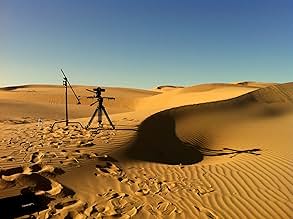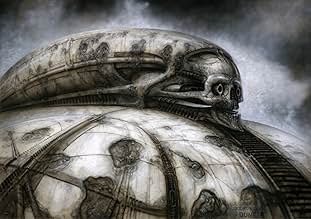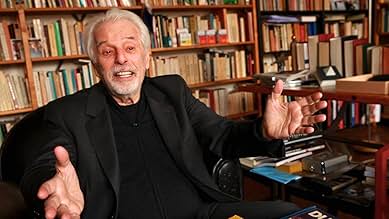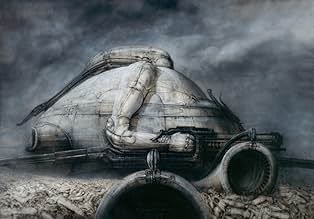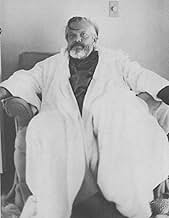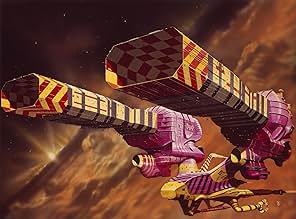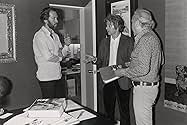Die Geschichte des Kultfilmregisseurs Alejandro Jodorowsky in seiner ambitionierten, aber letztlich zum Scheitern verurteilten Verfilmung des bahnbrechenden Science-Fiction-Romans.Die Geschichte des Kultfilmregisseurs Alejandro Jodorowsky in seiner ambitionierten, aber letztlich zum Scheitern verurteilten Verfilmung des bahnbrechenden Science-Fiction-Romans.Die Geschichte des Kultfilmregisseurs Alejandro Jodorowsky in seiner ambitionierten, aber letztlich zum Scheitern verurteilten Verfilmung des bahnbrechenden Science-Fiction-Romans.
- Auszeichnungen
- 12 Gewinne & 27 Nominierungen insgesamt
- Self
- (Archivfilmmaterial)
- Self
- (Archivfilmmaterial)
- (Synchronisation)
- Themselves
- (Archivfilmmaterial)
- Self
- (Archivfilmmaterial)
Empfohlene Bewertungen
All that survives of Jodorowsky's 'Dune' are the script, storyboards, and concept artwork. Using these, combined with talking-heads interviews of those involved, the documentary tries to show us how the finished film would have looked.
What makes all this so captivating are the interviews with Jodorowsky himself, and his incredible passion as he recounts the tale of an unfinished project from 40 years ago. Entering into Jodorowsky's world is like falling into a visionary dream where anything and everything is possible. And as his vision progresses, it becomes more and more ambitious: Salvador Dalì, Mick Jagger, and Orson Welles agree to star. Dan O'Bannon and H.R. Giger will design the sets and costumes. Pink Floyd will provide the score. It's hard to imagine a more ambitious movie, considering the technical limitations of the time.
Yet, as the documentary shows, the ripples from this never-completed, ahead-of-its-time film spread out in many directions, inspiring different ideas that made their way into later films such as 'Star Wars' and 'Alien' -- and which continue to inspire filmmakers today.
And last night I popped the disc in. Quite a lot of the first part is just talking to set the stage and explain who Jodorowsky is and what kind of movies he made. As it moves along it gets more interesting as we are shown some of the drawings and the out-of-this-world concepts in this 'Dune' movie. That of course never got made.
This is a great program for dune-fan-atics. For me is was just of mild interest. I watched some, skipped forward some, and never watched it to its conclusion. I just wasn't that interested in a movie that never got made.
The film gathers together the surviving members of the production crew to talk about the Jodorowsky version and how great it might have been. And, through the course of this film, you see many of the story boards, concept art and more.
As I watched this film, I couldn't help but think that if the Jodorowsky movie had been made, it probably would have been much weirder, much more violent* and much more confusing than the Lynch version. The Lynch film was mostly confusing because it was cut to pieces and should have been at least a 3-4 hour movie. The Jodorowsky version, in contrast, would have been so surreal as to make Lynch seem like an ordinary filmmaker! So, while everyone associated with this project thought the movie would have been great, I just have no idea WHO would have actually gone to see it...especially since Jodorowsky wanted to make a 12-20 hour film AND completely re-write the ending, in which Paul would die! I just can't see the fans wanting to see this...especially when in this documentary Jodorowsky talked about wanting to 'rape Frank Herbert" (not in a literal sense)!
It's a fascinating film where you get to follow Jodorowsky's thinking and the steps taken to try to get the film made. However, I cannot see this as a 'masterpiece' as some have said. First, it never got made...so how can it be a masterpiece? Second, while it could have been an amazing film (who knows?), it also might easily have been one of the biggest debacles in movie history, though the chances of the film being made seem insanely remote as you watch the documentary.
Overall, the documentary was fascinating and well worth seeing....the "Dune" project, however, sounded like a nutty gamble to say the least!
*If you don't think the film would have been uber-violent, watch Jodorowsky's "El Topo" and listen to some of the ideas the filmmaker wanted to incorporate into the movie (castration, dismemberment, etc.).
This is the missing link of science fiction history. Between 1960 and 1980, the world of science fiction evolved from cheesy robots and mad scientists to something far more visionary. Other given credit are "Alien", "2001", "Star Wars" and others... but perhaps it was this film that never got made.
H.R. Giger? Dan O'Bannon? Orson Welles? This is an incredible story, and really bridges a gap. Those watching "Dark Star" today (2015) might think it is a rather silly film, but put back into tits context and influence, it may be a much bigger piece of history than many think. How big would "Dune" have been?
I watched this documentary in anticipation of Denis Villeneuve's Dune, trying to better understand why adapting Dune in film has been such a challenge. One answer I came away with is that the sheer magnitude, complexity and transcendental nature of the source material triggers the fantasy-turned-burden of creating the greatest film in the history of cinema. It's like the Dune film has been the holy grail of modern sci-fi filmmaking. Jodorowsky was the first to chase it and was - and still very much is - convinced he had it. If only those pesky studio execs could see past the director's unconventional M.O. and cough up the money.
Jodorowsky's passionate and fascinating retelling of this epic adventure in filmmaking alone is enough to fill the screen for the whole 90 minutes, but we also get regaled with a good amount of the original concept art, animated storyboards and music that give us a taste of the project's intended aesthetic. The testimonies of some of the artists involved in the project help ground this implausible-sounding tale to reality.
I don't think the documentary makes any attempt to be objective, so it shouldn't be viewed as a complete chronicle of how this ambitious project went down. It's more a character piece on Jodorowsky himself, as a - slightly unhinged, slightly megalomaniac - uncompromising visionary, who at that one point in history managed to recruit an "army" (his term) of avant-garde talent (a jaw-dropping list of huge names from all over the artistic world from Orson Welles to Mick Jagger, from Salvador Dali to Pink Floyd).
Jodorowski the person is intriguing and flawed in equal measures. He reminded me a lot of Ayn Rand's Howard Roark (The Fountainhead) in the way that he put his art before anything and anyone else, displaying hints of cruelty: he admits to subjecting his 12-year-old son to a 2-year punishing training regime in preparation for his role as Paul Atreides, then he casually uses rape and "not respecting" women as a metaphor for creating great art (a bit you'd think the director would have chosen to cut out so as to protect the old man in this otherwise hagiographical portrayal).
In all, it's well worth a watch, especially in light of 2020's Dune, but it's good going into it knowing what to expect and what not to expect.
Wusstest du schon
- WissenswertesHollywood studios would only let Alejandro Jodorowsky make the film provided that it would be 1h 50 mins long. Jodorowsky declined, reportedly stating that he wanted to make approximately a 15 hour long film. This is a common misconception- he never planned that the actual movie was going to be 15-20 hours, he made this statement in a fit of passion that his artistry would not be confined or compromised by a running time restriction (the studios were asking for 90-120 min running time for profit reasons) asserting that he will make the film as long as he wants it to be, and not because some suit wants more money. While the "Dune Book" being a massive tome; held a script, a full storyboard, and numerous conceptual designs and art work with a budget breakdown it's easy to assume and misconstrued that the finished product would have been over 12 hours.
- PatzerJodorowsky confuses the timing of events when he talks about going to London to see if the members of Pink Floyd would do a score for the film. This would have happened in the mid 70s, since he said he had decided to contact Dan O'Bannon to come work on the project after seeing Dark Star (released in 1974). But he said Pink Floyd were working on Dark Of The Moon. However, that was released in 1973, too early to fit. It would be more likely they were finishing Wish You Were Here, released in1975.
- Zitate
Alejandro Jodorowsky: What is the goal of the life? It's to create yourself a soul. For me, movies are an art... more than an industry. And its the search of the human soul... as painting, as literature, as poetry. Movies are that for me.
- VerbindungenFeatured in Half in the Bag: 2014 Movie Catch-up: Part 2 (2014)
Top-Auswahl
Details
- Erscheinungsdatum
- Herkunftsländer
- Offizielle Standorte
- Sprachen
- Auch bekannt als
- «Дюна» Ходоровського
- Drehorte
- The Domes, Casa Grande, Arizona, USA(Scenes deleted)
- Produktionsfirmen
- Weitere beteiligte Unternehmen bei IMDbPro anzeigen
Box Office
- Bruttoertrag in den USA und Kanada
- 647.280 $
- Eröffnungswochenende in den USA und in Kanada
- 36.018 $
- 23. März 2014
- Weltweiter Bruttoertrag
- 662.736 $
- Laufzeit
- 1 Std. 30 Min.(90 min)
- Farbe
- Sound-Mix
- Seitenverhältnis
- 1.78 : 1







